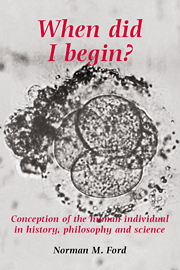Book contents
- Frontmatter
- Contents
- Foreword
- Preface
- 1 Introduction
- 2 Historical influence of Aristotle on the theory of human reproduction
- 3 Criteria for being a human individual
- 4 Fertilization and the beginning of a human individual
- 5 Implantation and the beginning of the human individual
- 6 The human individual begins after implantation
- Appendixes
- Notes
- Glossary
- Index
3 - Criteria for being a human individual
Published online by Cambridge University Press: 03 February 2010
- Frontmatter
- Contents
- Foreword
- Preface
- 1 Introduction
- 2 Historical influence of Aristotle on the theory of human reproduction
- 3 Criteria for being a human individual
- 4 Fertilization and the beginning of a human individual
- 5 Implantation and the beginning of the human individual
- 6 The human individual begins after implantation
- Appendixes
- Notes
- Glossary
- Index
Summary
Ordinary knowledge of human individuals
Our knowledge of things in the world is at first global and generic before progressing to become more specific. Most of our ordinary knowledge is expressed by predicating something of an object. This is usually called the logical subject. Thus when I say ‘The cat is black’, I know something about ‘the cat’ that is the logical subject of the statement. The logical subject refers to something that exists in the world of experience of the speaker. This ability to refer to something as really given in our world is the simplest form of knowledge that we have, e.g. ‘The cat .…’ Admittedly, this sort of knowledge does not tell us very much unless we say something else, i.e. predicate something about it thereby expanding our knowledge of it. If we can only refer to something and are unable to know anything more about it, we can say that it is there or here. For example, ‘There's a cat’ or ‘A cat is here’ or, at least, ‘Something is here’.
The knowledge involved in our ability to refer to an object is indeed imperfect, but it is knowledge of a sort that serves as a starting point for acquiring more knowledge about it. Our ability to refer to things is the launching pad for all our further intellectual explorations. Crucial to the building up of knowledge is our ability to differentiate between the various objects encountered in our experience. This enables them to become the logical subjects of our thoughts without running the risk of constant confusion. In ordinary discourse we say something about what we refer to or talk about.
- Type
- Chapter
- Information
- When Did I Begin?Conception of the Human Individual in History, Philosophy and Science, pp. 65 - 101Publisher: Cambridge University PressPrint publication year: 1988



